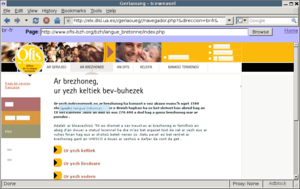Difference between revisions of "Geriaoueg"
| (14 intermediate revisions by 5 users not shown) | |||
| Line 1: | Line 1: | ||
{{Github-unmigrated-tool}} |
|||
[[Image:Pantallazo-Geriaoueg.png|thumb|right|Browsing a Breton website with Geriaoueg pop-up vocabulary hints in French.]] |
[[Image:Pantallazo-Geriaoueg.png|thumb|right|Browsing a Breton website with Geriaoueg pop-up vocabulary hints in French.]] |
||
'''Geriaoueg''' is a set of scripts which use apertium morphological analysers (see [[list of dictionaries]]) and a bilingual wordlist to provide vocabulary help when browsing the web. It was inspired by the BBC's "[http://www.bbc.co.uk/cymru/vocab/ Vocab]" tool. The software can be found in [ |
'''Geriaoueg''' is a set of scripts which use apertium morphological analysers (see [[list of dictionaries]]) and a bilingual wordlist to provide vocabulary help when browsing the web. It was inspired by the BBC's "[http://www.bbc.co.uk/cymru/vocab/ Vocab]" tool. The software can be found in [https://svn.code.sf.net/p/apertium/svn/trunk/apertium-tools/geriaoueg/ <code>apertium-tools/geriaoueg</code>], currently it works with most web browsers with the exception of Internet Explorer. |
||
In order to set up the software for a new pair of languages you will need a morphological analyser which outputs Apertium format analyses (e.g. with [[lttoolbox]] or [[ |
In order to set up the software for a new pair of languages you will need a morphological analyser which outputs Apertium format analyses (e.g. with [[lttoolbox]] or [[HFST]]) and a bilingual tab-separated wordlist. It is hoped that this will make Apertium format resources more useful to more people, and be a step toward building a full machine translation system. |
||
There has also been work on browser plugins with similar functionality. |
|||
==Todo== |
|||
* Make it parse HTML better — there will be a list of websites it is expected to parse, e.g. BBC News, VilaWeb, VOA, Wikipedia |
|||
* Make it deal with different character encodings (at least ISO-8859-x and UTF-8) |
|||
* Make it work with Internet Explorer |
|||
* Extend it to support more languages (at least all of the trunk/ languages — approx. 20) |
|||
* Internationalisation of the interface (.po-ise all strings) |
|||
* Make it prettier (see for example BBC Vocab and Lingro) |
|||
* An option which will only highlight the words above/under a certain frequency freshhold, like a sliding bar. For beginners they can have all the words highlighted, but for more advanced readers, they can have only the most infrequent words. |
|||
* A way to have Basque, Kyrgyz and Sámi work, and compounds |
|||
* Make it optionally read in dictionaries in [[lttoolbox]] format. |
|||
==External links== |
==External links== |
||
* [http://elx.dlsi.ua.es/geriaoueg/ Geriaoueg] |
* [http://elx.dlsi.ua.es/geriaoueg/ Geriaoueg] |
||
* https://github.com/vigneshv59/geriaoueg-firefox (gci 2014 project) |
|||
* https://github.com/vigneshv59/geriaoueg-chrome (gci 2014 project) |
|||
* https://github.com/GrammarSoft/proofing-webext may also have useful code to parse HTML, specifically [https://github.com/GrammarSoft/proofing-webext/blob/master/js/shared.js#L159 skipNonText] and rest of that file. |
|||
[[Category:Tools]] |
[[Category:Tools]] |
||
Latest revision as of 09:27, 4 April 2021
Geriaoueg is a set of scripts which use apertium morphological analysers (see list of dictionaries) and a bilingual wordlist to provide vocabulary help when browsing the web. It was inspired by the BBC's "Vocab" tool. The software can be found in apertium-tools/geriaoueg, currently it works with most web browsers with the exception of Internet Explorer.
In order to set up the software for a new pair of languages you will need a morphological analyser which outputs Apertium format analyses (e.g. with lttoolbox or HFST) and a bilingual tab-separated wordlist. It is hoped that this will make Apertium format resources more useful to more people, and be a step toward building a full machine translation system.
There has also been work on browser plugins with similar functionality.
Todo[edit]
- Make it parse HTML better — there will be a list of websites it is expected to parse, e.g. BBC News, VilaWeb, VOA, Wikipedia
- Make it deal with different character encodings (at least ISO-8859-x and UTF-8)
- Make it work with Internet Explorer
- Extend it to support more languages (at least all of the trunk/ languages — approx. 20)
- Internationalisation of the interface (.po-ise all strings)
- Make it prettier (see for example BBC Vocab and Lingro)
- An option which will only highlight the words above/under a certain frequency freshhold, like a sliding bar. For beginners they can have all the words highlighted, but for more advanced readers, they can have only the most infrequent words.
- A way to have Basque, Kyrgyz and Sámi work, and compounds
- Make it optionally read in dictionaries in lttoolbox format.
External links[edit]
- Geriaoueg
- https://github.com/vigneshv59/geriaoueg-firefox (gci 2014 project)
- https://github.com/vigneshv59/geriaoueg-chrome (gci 2014 project)
- https://github.com/GrammarSoft/proofing-webext may also have useful code to parse HTML, specifically skipNonText and rest of that file.
